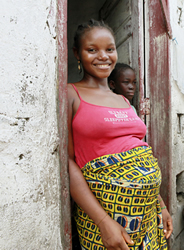I knew I had reached an important milestone in my mother’s eyes about six years ago when I was preparing the Passover seder meal and she called me a balabusta. According to my mother, this is a Yiddish expression that means being a good homemaker, the family glue, or the one that holds everything together.
For the past three years, I’ve had the privilege to lead an initiative at the UN Foundation – the Universal Access Project – which strives for universal access to reproductive health and family planning. Today, on International Women’s Day, I find myself thinking about the importance of access to contraception in the US and globally. To me, it means having the tools to care for your family and be an effective balabusta.
 In my life, a balabusta cooks meals, organizes traditional holidays, and builds community around the family. A balabusta is the one who not only births the children, but also creates a nurturing home.
In my life, a balabusta cooks meals, organizes traditional holidays, and builds community around the family. A balabusta is the one who not only births the children, but also creates a nurturing home.
What I’ve found on my trips to developing countries is that access to contraception allows a woman to choose the timing, number and spacing of her children. When I visited Senegal in December, I saw first-hand how access to voluntary contraception affects the health of the family. Parents are better able to feed and clothe their children and send those children to school. Mothers are better able to engage in economic livelihood activities, leading to healthier families and more prosperous communities.
It is shocking that currently 215 million women around the globe want, but do not have, access to quality reproductive health and family planning services. Meeting the demand for family planning would result in a 32 percent decrease in maternal deaths, and reduce infant mortality by 10-20 percent. Investments in family planning are crucial to achieving access to basic resources such as food, health care, and primary education.
Yet, despite the many benefits of voluntary family planning, governments, including the U.S., have failed to prioritize funding. Through our Universal Access Project, we are working with the US, the UN and our NGO partners to ensure that universal access to sexual and reproductive health education, services and supplies is a top priority of the international development agenda. So far, the initiative has contributed to a 30 percent increase in U.S. funding. We have also seen the restoration of funding to the United Nations Population Fund (UNFPA), a critical UN agency that promotes the right of every woman, man and child to enjoy a life of health and equal opportunity.
At the UN Foundation, we know that investing in women and girls is one of our smartest investments. When women and girls are empowered, they can deliver for their communities, families and our world.
Access to contraception, both in the US and in the developing world, is key to creating a flourishing family life and being a balabusta.

